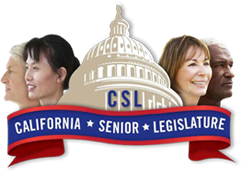About the CSL
The California Senior Legislature is a volunteer body whose primary mission is to gather ideas for legislation at the state and federal levels, craft the ideas into formal proposals, prioritize the proposals, present them to members of the Legislature or the Congress, and advocate for laws implementing the ideas.
The CSL was founded largely through the efforts of Senator Henry Mello, who in 1980 requested through ACR 129 that the California Commission on Aging call a session of the Silver-Haired Legislature, a forum through which older Californians could develop their legislative priorities. In 1982 this became the California Senior Legislature and Senator Mello in SCR 44 asked that this be an annual event.
The CSL is established in state statute: Welfare and Institutions Code sections 9300-9305. Welfare and Institutions Code sections Taxation Code Sections 18730-18733 provide for the California Fund for Senior Citizens using funds designated on California individual tax returns.
The 40 Senior Senators and 80 Senior Assembly Members are selected in elections supervised by the Advisory Councils in the 33 Planning and Services Areas (PSAs) in California which were established by the federal Older Americans Act of 1965. The elections are in even-numbered years and the terms of office are four years.
Each October, the CSL meets in Sacramento to convene a model legislative session in the chambers and hearing rooms of the State Capitol. The CSL members participate in hearing testimony, debating issues, and voting to approve or disapprove legislative proposals.
During the October session of the Senior Legislature hearings on the proposals are held in policy committees of the Senior Senate and the Senior Assembly. There are five standing policy committees in each house:
- Health
- Finance and Insurance
- State and Local Government
- Housing and Transportation
- Social and Community Services
In order to be considered for authoring in the Legislature or Congress, each proposal is considered four times — by one policy committee of each house, and then on the floor of each house by the Senior Senate and the Senior Assembly.
Prior to the Annual session, ideas are researched and made into proposals. Following the session, the top ten state proposals and top four federal are taken to state legislators or members of Congress who are asked to author and carry appropriate bills in the Legislature or Congress.
Senior Legislators seek state lawmakers to author at least 10 of the Session’s priority proposals. They then work throughout the year to ensure adoption of these measures.
